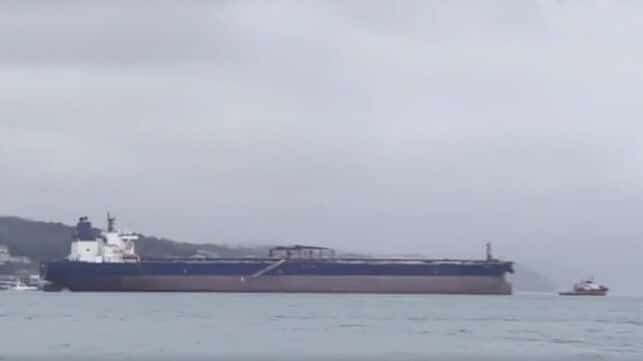Bosphorus Traffic Disrupted by Disabled Tanker

The Bosphorus Strait, a vital maritime route, faced significant disruptions today, December 26, due to a disabled tanker. Turkish officials suspended vessel traffic in both directions as they responded to the incident. This event marks yet another mechanical failure involving tankers engaged in the Russian oil trade, raising concerns about safety and operational efficiency in this busy waterway.
Incident Overview: The Cordelia Moon
The disabled tanker, named Cordelia Moon, is a large vessel with a deadweight tonnage of 163,288. It was en route to Novorossiysk after undergoing repairs from a previous attack by the Houthi forces. This attack occurred in early October and involved a barrage of missiles, drones, and a bomb boat, which caused significant damage to the ship. Videos circulated online showing the security team attempting to neutralize the bomb boat during the incident.
Today, the Cordelia Moon experienced an engine failure while navigating the Bosphorus. The Turkish Directorate General of Coastal Safety quickly dispatched three tugboats—Kurtarma-8, Kurtarma-10, and Kurtarma-11—to assist in towing the disabled vessel to the Ahırkapı Anchorage Area. As the operation unfolded, authorities suspended traffic in both the northbound and southbound lanes of the strait. The tanker, managed from India and registered in Panama, was empty during its journey to Russia, which may have contributed to the incident’s severity.
Easier EEDI process: DNV validates Norsepower’s new EEDI/EEXI calculation method
A Pattern of Mechanical Failures
The incident involving the Cordelia Moon is not an isolated case. In recent months, there have been multiple occurrences of mechanical failures among tankers operating in the Bosphorus. Just last month, a smaller product tanker named Nazan, with a deadweight tonnage of 4,600, also caused a temporary closure of the strait due to a rudder malfunction. Similarly, in August, another product tanker, the Sredina, weighing 34,800 dwt, reported engine issues while traveling from Russia to Libya, leading to further traffic disruptions.
These repeated incidents raise questions about the safety protocols and maintenance practices for vessels operating in this critical maritime corridor. The Bosphorus Strait is known for its challenging navigation conditions, and the frequency of these mechanical failures could pose risks not only to the vessels involved but also to the environment and local maritime traffic.
In addition to these mechanical issues, maritime authorities are also dealing with other incidents. Earlier this week, Greek authorities detained an unidentified tanker after it collided with a cargo ship in a lane east of Piraeus. Fortunately, there were no injuries reported, but the investigation into the cause of the collision is ongoing.
As the maritime community continues to monitor these developments, the need for enhanced safety measures and rigorous inspections for tankers operating in the Bosphorus becomes increasingly apparent.
